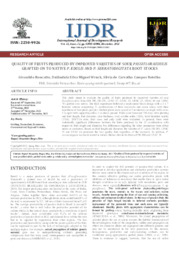Quality of fruits produced by improved varieties of sour passifloraedulis grafted on to native P. edulis and P. serratodigitata root stocks.
Quality of fruits produced by improved varieties of sour passifloraedulis grafted on to native P. edulis and P. serratodigitata root stocks.
Author(s): RONCATTO, G.; WRUCK, D. S. M.; BOTELHO, S. de C. C.
Summary: This study aimed to evaluate the quality of fruits produced by improved varieties of sour Passifloraedulis Sims (FB 100, FB 200, UFAC 07, UFAC 38, UFAC 25, UFAC 64 and UFAC 70) grafted onto native. The field experiment followed a randomized block design with a 3 x 7 factorial scheme comprising 21 combinations of three rootstocks and seven scions with three repetitions of four plants per plot. Grafted plants were spaced at 3 m intervals in single trellis rows 5 m apart with supporting wires 2 m above ground. Fruits were harvested 380 days after planting and fruit length, fruit diameter, skin thickness, total soluble solids (TSS), total titratable acidity (TTA), TSS/TTA ratio, fruit mass and pulp yield were evaluated. In general, there were statistically significant differences between the fruits produced by the 21 combinations with respect to fruit length and diameter, but differences regarding the other parameters were either minor or inexistent. Based on fruit length and diameter, the varieties of P. edulis FB 200, UFAC 25 and UFAC 64 produced the best quality fruit regardless of the rootstock. In addition, P. serratodigitata rootstock tended to induce thicker skin in the fruits of FB 200 and UFAC 38.
Publication year: 2022
Types of publication: Journal article
Keywords: Fruta, Grafting (plants), Varieties
Observation
Some of Embrapa's publications are published as ePub files. To read them, use or download one of the following free software options to your computer or mobile device. Android: Google Play Books; IOS: iBooks; Windows and Linux: Calibre.
Access other publications
Access the Agricultural Research Database (BDPA) to consult Embrapa's full library collection and records.
Visit Embrapa Bookstore to purchase books and other publications sold by Embrapa.

